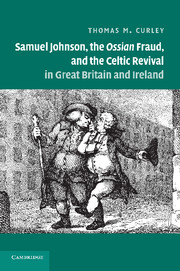Book contents
- Frontmatter
- Contents
- Prefatory acknowledgments
- 1 An introductory survey of scholarship on Ossian: why literary truth matters
- 2 James Macpherson's violation of literary truth
- 3 Johnson on truth, frauds, and folklore: in the company of Thomas Percy
- 4 Searching for truth in the Highlands: Macpherson throws down the gauntlet
- 5 Charles O'Conor and the Celtic Revival in Ireland
- 6 Johnson and the Irish: more opposition to Ossian
- 7 Johnson's last word on Ossian with William Shaw: a finale to controversy
- Appendix A A Reply to Mr. Clark's Answer
- Notes
- Bibliography
- Index
7 - Johnson's last word on Ossian with William Shaw: a finale to controversy
Published online by Cambridge University Press: 30 July 2009
- Frontmatter
- Contents
- Prefatory acknowledgments
- 1 An introductory survey of scholarship on Ossian: why literary truth matters
- 2 James Macpherson's violation of literary truth
- 3 Johnson on truth, frauds, and folklore: in the company of Thomas Percy
- 4 Searching for truth in the Highlands: Macpherson throws down the gauntlet
- 5 Charles O'Conor and the Celtic Revival in Ireland
- 6 Johnson and the Irish: more opposition to Ossian
- 7 Johnson's last word on Ossian with William Shaw: a finale to controversy
- Appendix A A Reply to Mr. Clark's Answer
- Notes
- Bibliography
- Index
Summary
My assertions are for the most part purely negative; I deny the existence of Fingal, because in a long and curious peregrination through the Galic regions I have never been able to find it.
William Shaw (with Samuel Johnson), A Reply to Mr. Clark's Answer (1782)William Shaw the Highlander came out of nowhere into Johnson's later life of writing. Their first meeting coincided with the revival of the Ossian controversy, instigated by A Journey to the Western Highlands of Scotland. Their forgotten friendship originated in a common desire to further the study of Gaelic and climaxed in a heated war of words over Macpherson's popular pseudo-Gaelic poetry near the end of Johnson's life. While Scots upheld farfetched Ossianic claims as a matter of national honor, Irishmen objected to historical revisionism slighting the primacy of their Gaelic identity. Englishmen in their turn could regard the noisy dispute with aloof neutrality or invincible skepticism reflecting a superiority complex toward other subjects in the British Isles at a perilous time of American Revolution. Within a context of smoldering culture wars at home exacerbated by insurrection abroad, Shaw emerged in the literary debate as a Scottish Gaelic scholar with Johnsonian allegiances, a true British composite of ideological dichotomies making him seem a traitor in his countrymen's eyes and a defender of truth in his own.
- Type
- Chapter
- Information
- Samuel Johnson, the Ossian Fraud, and the Celtic Revival in Great Britain and Ireland , pp. 191 - 230Publisher: Cambridge University PressPrint publication year: 2009



